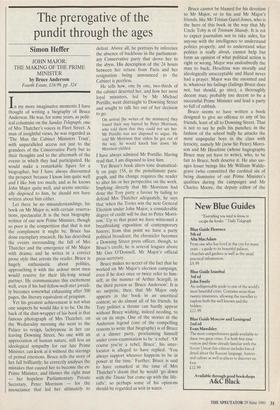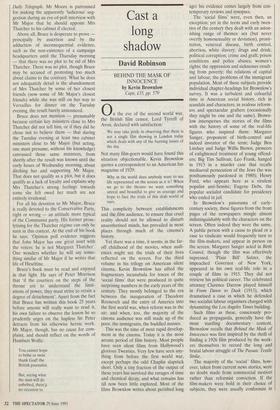The prerogative of the pundit through the ages
Simon Heifer
JOHN MAJOR: THE MAKING OF THE PRIME MINISTER by Bruce Anderson Fourth Estate, f16.99, pp. 324 In my more imaginative moments I have thought of writing a biography of Bruce Anderson. He was, for some years, as polit- ical columnist on the Sunday Telegraph, one of Mrs Thatcher's voices in Fleet Street. A man of insightful views, he was regarded as `The Man the Cabinet Ministers Trust', with unparalleled access not just to the grandees of the Conservative Party but to their thoughts and to the aftermath of the events in which they had participated. He would make a remarkable figure for a biographer, but I have always discounted the prospect because I know him quite well and I like him too much; and as he knows John Major quite well, and seems uncritic- ally disposed to him, he should not have written about him either.
Let there be no misunderstandings; his book on Mr Major is, with certain reserva- tions, spectacular. It is the best biography written of our new Prime Minister, though so poor is the competition that that is not the compliment it might be. Bruce has done exemplary research. He has described the events surrounding the fall of Mrs Thatcher and the emergence of Mr Major with drama; and he writes in a correct prose style that arrests the reader. Bruce is hugely enthusiastic about politics, approaching it with the ardour most men would reserve for their life-long sexual partner. He communicates this excitement well, even if his hail-fellow-well-met joviali- ty becomes somewhat exhausting after 300 pages, the literary equivalent of priapism.
Yet his greatest achievement is not what one suspects he would like it to be. On the back of the dust-wrapper of his book is that famous photograph of Mrs Thatcher, on the Wednesday morning she went to the Palace to resign, lachrymose in her car leaving Downing Street. No one with an appreciation of human nature, still less an ideological sympathy for our late Prime Minister, can look at it without the stirrings of primal emotions. Bruce tells the story of her fall brilliantly; he correctly analyses the mistakes that caused her to become the ex- Prime Minister, and blames the right man — her hopeless Parliamentary Private Secretary, Peter Morrison — for the insouciance that led her ultimately to defeat. Above all, he portrays by inference the absence of backbone in the parliament- ary Conservative party that drove her to the abyss. His description of the 24 hours between her return from Paris and her resignation being announced to the Cabinet is peerless.
He tells how, one by one, two-thirds of the cabinet deserted her, and how her most loyal ministers, led by Mr Michael Portillo, went distraught to Downing Street and sought to talk her out of her decision to go.
On arrival [he writes of the ministers] they found their way barred by Peter Morrison, who told them that they could not see her. Mr Portillo was not disposed to argue. He told Mr Morrison that unless he got out of the way, he would knock him down. Mr Morrison yielded.
I have always admired Mr Portillo. Having read that, I am disposed to love him.
Yet Bruce's book alters tone dramatical- ly on page 158, in the penultimate para- graph, and the change requires the reader to alter his or her perspective on the work. Implying directly that Mr Morrison had done the Tory party a favour by failing to defend Mrs Thatcher adequately, he says that 'when the Tories win the next General Election under John Major, a considerable degree of credit will be due to Peter Morri- son.' Up to that point we have witnessed a breathtaking exposition of contemporary history; from that point we have a party political broadcast; the chronicler becomes a Downing Street press officer, though, to Bruce's credit, he is several leagues above Mr Gus O'Donnell, Mr Major's official press secretary.
Bruce makes no secret of the fact that he worked on Mr Major's election campaign, even if he does once or twice refer to him- self, in the manner of Arthur Scargill, in the third person as 'Bruce Anderson'. It is no surprise, then, that Mr Major only appears in the book in an uncritical context; so do almost all of his friends. In Tory politics a throne can hardly appear without Bruce wishing, indeed needing, to sit on its steps. One of the stories in the Anderson legend (one of the compelling reasons to write that biography) is of Bruce at a dinner party, proclaiming himself under cross-examination to be 'a rebel'. 'Of course you're a rebel, Bruce', his inter- locutor is alleged to have replied. 'You always support whoever happens to be in power at the time.' Further, Bruce is said to have remarked at the time of Mrs Thatcher's doom that he would 'go down with the Titanic but come up with the life- rafts'; so perhaps some of his opinions should be regarded as writ in water. Bruce cannot be blamed for his devotion to Mr Major, or to his and Mr Major's friends, like Mr Tristan Garel-Jones, who is the hero of this book in the way that My Uncle Toby is of Tristram Shandy. It is rot to expect journalists not to take sides, for anyone with the intelligence to understand politics properly, and to understand what politics is really about, cannot help but form an opinion of what political action is right or wrong. Major was undoubtedly the man to back; Heseltine was morally and ideologically unacceptable and Hurd never had a prayer. Major was the anointed and is, whatever his failings (failings Bruce does not, but should, go into), a thoroughly decent man; probably too decent to be a successful Prime Minister and lead a party so full of rubbish.
Bruce seems to have written a book designed to give no offence to any of his friends, least of all to Downing Street. That is not to say he pulls his punches; in the fashion of the school bully he attacks the most unpopular boys in the class with ferocity, namely Mr (now Sir Peter) Morri- son and Mr Heseltine (whose hagiography Bruce may yet have to write), who, to be fair to Bruce, both deserve it. He also sav- ages lesser beings like Mr William Walde- grave (who committed the cardinal sin of being dismissive of our Prime Minister's qualities during the campaign) and Mr Charles Moore, the deputy editor of the
Daily Telegraph. Mr Moore is patronised for making the apparently 'ludicrous' sug- gestion during an eve-of-poll interview with Mr Major that he should appoint Mrs Thatcher to his cabinet if elected.
Above all, Bruce is desperate to prove principally by assertion and by the adduction of inconsequential evidence, such as the non-existence of a campaign headquarters until the Thursday morning — that there was no plot to be rid of Mrs Thatcher. There was no plot, though Bruce may be accused of protesting too much about claims to the contrary. What he does not adequately detail is the abandonment of Mrs Thatcher by some of her closest friends (now some of Mr Major's closest friends) while she was still on her way to Versailles for dinner on the Tuesday evening, the result barely announced.
Bruce does not mention — presumably because certain key ministers close to Mrs Thatcher did not tell him, or if they did he chose not to believe them — that during the Tuesday evening at least two cabinet ministers close to Mr Major (but acting, one must presume, without his knowledge) canvassed those same ministers, from shortly after the result was known until the early hours of Wednesday morning, about ditching her and supporting Mr Major. That does not qualify as a plot, but it does qualify as a lack of loyalty and explains why Mrs Thatcher's strong feelings towards some she felt owed her much are not entirely irrational.
For all his devotion to Mr Major, Bruce is really devoted to the Conservative Party, right or wrong — an attitude more typical of the Communist party. His former prose- lytising for the Thatcher regime can only be seen in this context. At the end of his book he says: 'Opinion poll evidence suggests that John Major has one great asset with the voters: he is not Margaret Thatcher'. One wonders whether he will say some- thing similar of Mr Major if he writes that life of Heseltine.
Bruce's book must be read and enjoyed in that light. He says of Peter Morrison that 'if the courtiers on the steps of the throne are to understand the limit- ations of power, they must strive to retain a degree of detachment'. Apart from the fact that Bruce has written this book 25 years before anyone will really want to read it, his own failure to observe the lesson he so prudently urges on the hapless Sir Peter detracts from his otherwise heroic work. Mr Major, though, has no cause for com- plaint, and should reflect on the words of Humbert Wolfe:
You cannot hope to bribe or twist thank God! the British journalist.
But, seeing what the man will do unbribed, there's no occasion to.



















































 Previous page
Previous page